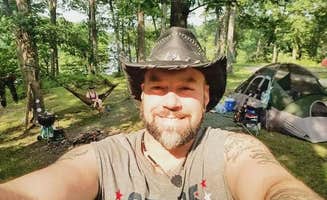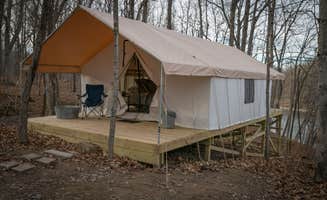Tent camping options near Virginia, Illinois span across central Illinois in areas primarily characterized by rolling farmland and scattered woodlands. Most campgrounds in this region sit at elevations between 500-700 feet above sea level, with spring and fall offering the most comfortable camping conditions. Summer temperatures regularly exceed 85°F with high humidity levels, making mosquito protection essential for campers throughout the warmer months.
What to do
Fishing opportunities: Spring Lake State Fish and Wildlife Area provides dedicated fishing spots along its shallow lake. Campers can access specially designed pullouts along the road for bank fishing or launch boats for deeper water access. According to Art S., "There is lots of fishing opportunity here. Spring Lake is long and shallow. They allow pole fishing. We saw people fishing from boats as well as from nicely designed pullouts along the road."
Wildlife viewing: Edward Madigan State Fish and Wildlife Area offers natural habitat for various wildlife species. The undeveloped setting attracts birds and small mammals. "Would take my family back!" notes Sarra W., suggesting the natural setting provides memorable wildlife encounters.
Hiking trails: Tent campers can access trails directly from some campsites. At Spring Lake, the Deer Run trail connects directly to the campground, allowing for convenient day hikes without driving. Art S. mentions, "Deer run hiking trail is right in camp and gets you a bit of a hike."
What campers like
Quieter camping experience: Many tent sites in the Virginia area see limited usage, creating peaceful overnight stays. At Waverly Lake City Park, campers appreciate the solitude. Darren D. notes, "We had a pleasant and fairly private experience. Each site is spread out and fairly well."
Site separation: Campgrounds like Waverly Lake feature dispersed sites rather than crowded arrangements. This setup provides more privacy than typical campgrounds. "My wife and I really enjoy this campsite," adds another review from Darren D.
Lakeside settings: Several campgrounds offer water views or access. Barbara P. shares about Rainey Park: "This is a paved lot past the ballfields. Pull in at the sign and follow the road... Quiet night, great stop."
What you should know
Access challenges: Some campgrounds require significant travel on rural roads. Spring Lake campers should prepare for longer approach times. Art S. advises, "Be ready for a long slow drive in to the campground. Follow signs that direct you to the camp office. That's where the camping is."
Wildlife concerns: Tent campers need proper food storage to prevent unwanted animal encounters. Darren D. warns about Waverly Lake: "Be mindful of field roaches and raccoons at night, as we had to learn the hard way the morning after our first night. Oh, and the mosquitoes are BRUTAL. Come prepared."
Stay limitations: Most campgrounds enforce restrictions on consecutive camping nights. At Hidden Ridge, reservation policies help manage visitor numbers, while other locations have specific stay limits similar to Waverly Lake's 4-day rule.
Tips for camping with families
Limited facilities: Most tent sites have minimal amenities for children. Parents should pack necessary supplies including drinking water. When camping at Waverly Lake, John H. notes, "As far as I know there's no running water. There are portable toilets that are kept clean."
Parking considerations: At some locations, tent sites require short walks from parking areas. Spring Lake features walk-in camping, though Art S. mentions, "This campground has walk-in only camping but it's right next to where you park."
Weather preparedness: Central Illinois experiences rapid weather changes, particularly during spring and fall. Summer camping at Edward Madigan State Fish and Wildlife Area requires heat preparation, especially important for families with young children or pets.
Tips from RVers
Limited RV options: Most tent camping areas near Virginia have few accommodations for larger vehicles. Barbara P. cautions that at Rainey Park, "No tent camping allowed," indicating the area serves primarily as an overnight parking option rather than full-service camping.
Alternative overnight parking: RVers seeking quick stops near Virginia can use designated areas like Rainey Park. Barbara P. advises calling local authorities to confirm parking status: "I called the police to verify parking is still allowed and they said no problem."
Dump station access: Spring Lake provides sanitary dump facilities, making it one of the few locations in the area with this service for self-contained RVs.



